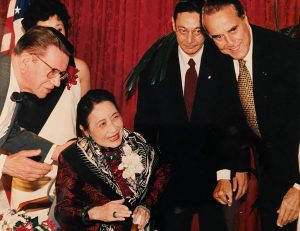I was saddened to hear of the passing of Bob Dole, the longtime U.S. senator, three-time Republican presidential candidate, and World War II hero. I had the great fortune to know him personally through my work at the U.S. Library of Congress.
In 1995 I sought out Congressional support for an event marking the 50th anniversary of the end of World War II and the China-U.S. alliance. This came at a turbulent time for China-U.S. relations, with growing tensions in the Taiwan Strait. It was perhaps for this reason that then-Senator Joe Biden declined to support the commemorative event. But Dole was an enthusiastic supporter and the event proved to be a massive success, with Soong Mei-ling – Madame Chiang Kai-shek – herself attending.
I had the privilege of visiting Dole at his home many times and came to know both him and his wife Elizabeth. I appreciated his sincerity, strong sense of public service, and good humor – all of which have been noted in the commemorations of his life. While there are many reasons for Americans to mourn Dole, his passing coming within a day of the 80th anniversary of the attack on Pearl Harbor has me reflecting on the passing of the greatest generation and a lost era of U.S.-China cooperation.
Many American veterans of World War II gained first-hand experience in China, and even those who did not serve in the Pacific Theater – like Dole, who served in Europe – or who never set foot in China could appreciate the significance of China’s fight against the Japanese. This effort drew Japanese forces and resources away from the fight against the U.S.-led forces in the Pacific. Before the establishment of the People’s Republic of China in 1949, the isolation of Cold War, and the outbreak of armed conflict between Chinese and American forces in Korea, the United States and China were allies. But this abrupt change of circumstances all but eroded the legacy of this cooperation, and today both Washington and Beijing show little capacity to remember or acknowledge this era.
I witnessed this peculiar shift in American attitudes first-hand. As a student who arrived in the United States from China in 1949, I was initially welcomed with open arms, especially by veterans of the Pacific War. At the University of Maryland one man even stopped me on the street to reflect fondly on his time in China during the war. He helped me find an affordable apartment and later helped my wife find a job. Yet within a matter of years, a professor at the university told me I was not welcome in his class because his relative had died fighting the Chinese in Korea.
The Greatest Generation thus had a unique experience as Americans who saw the Chinese as their allies and friends. Bob Dole encompassed this tendency and was a stout supporter of the Republic of China throughout his career. He was not alone in carrying this experience into the halls of the U.S. Congress. His contemporaries, including Senators Mike Mansfield and Paul Simon, likewise remembered a China before the Cold War and the McCarthy era made support Sino-American cooperation taboo. Congress’s long-standing support for Taiwan was forged by these figures who saw the Chinese as their allies and former brothers-in-arms.
It is of course not just Americans that have forgotten this era. The late George H.W. Bush, who served in the Pacific Theater himself, lamented how China seemed to have forgotten this period as well during his tenure as head of the U.S. Liaison Office in Beijing. He wrote in his diary on Christmas Day, 1974:
It is hard to equate the decency, kindness, humor, gentility of the people of China with some of the rhetoric aimed against the United States. I think back to our own recent experience. World War II. We sought no territory. We were trying to defeat a common enemy. We came to help and yet we are bitterly attacked and lumped in with those who tried to colonize and pillage. We are the imperialist.
President Biden evoked the Pearl Harbor anniversary and the cooperation between the U.S. and Soviet Union in his virtual meeting with Russian President Vladimir Putin on Tuesday. It is a sad reflection on the state of the China-U.S. relationship that the 80th anniversary of both the Pearl Harbor attack and the Japanese invasion of Hong Kong passed without Washington or Beijing noting the era of unprecedented China-U.S. cooperation that these attacks catalyzed. Instead, the United States and China seem more apart than ever, with the White House recently announcing a U.S. boycott of the upcoming 2022 Beijing Olympic Games.
Today, there remains a bedrock of support for the Republic of China on Taiwan, but it is mostly divorced from the nuance and first-hand experience that drove this support from the Greatest Generation. Consider California Congresswoman Nancy Mace, who visited Taiwan last month and tweeted about entering the “Republic of Taiwan.” Such an ignorant statement – which the congresswoman insisted was planned – demonstrates just how poorly today’s Congress understands the intricacies of the U.S. relationship with China and how little they actual know about the history of the alliance between the United States and the Republic of China.
Americans should mourn Bob Dole because of his dedicated career as a public servant, his heroism and sacrifice during World War II, and his general good humor and humility even in the face of political defeat. His passing also offers an opportunity to remember an era in which the United States and China were united in common purpose against a common enemy – an era that sadly seems to be forgotten by all sides.

































